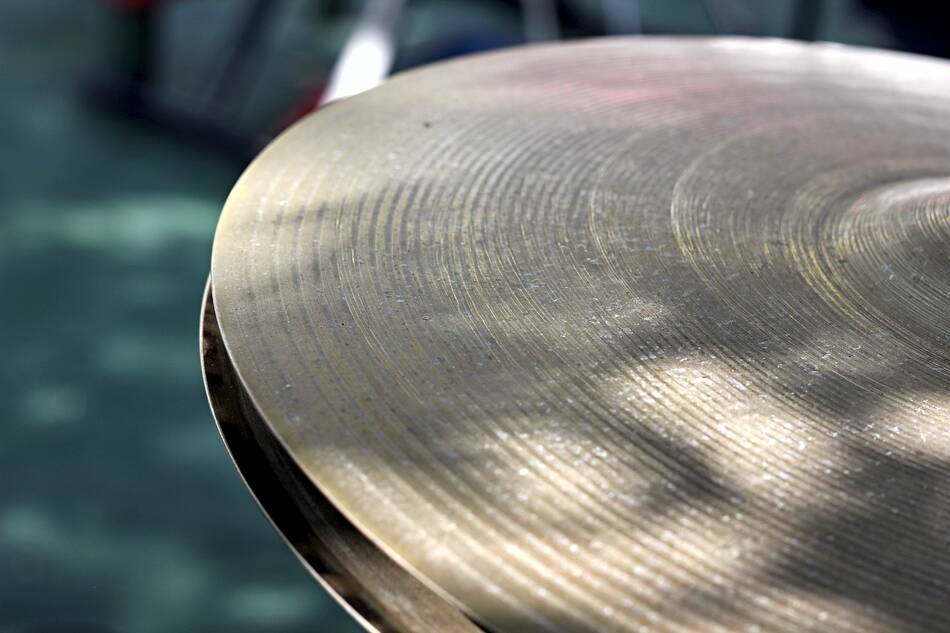
Every drummer knows how important cymbals are. They are a well-known part of a standard drum set. Cymbals often mark the transition into a new section of a song or signal the dramatic end of a great tune.
Cymbals can usually be grouped into four broad groups. These are; Crash, Hi-hat, Ride, and Effect. Unlike other members of a drum set, cymbals are made of metal. This has led many new drummers to ask, “Do cymbals wear out?”
Yes, Cymbals do wear out over time. Cymbals are fairly ductile round plates made from alloys of different metals. Drummers who hit cymbals very hard can wear them out quickly. Over time, as you hit them, the structural composition of the metal weakens, causing the cymbals to break.
Before we continue, I have to say this right off the bat. The wearing out of cymbals is quite normal, and in most cases, drummers prefer their cymbals worn out a bit. It’s all part of the aging process. However, that’s not the point of this article. Check out our article on how cymbals sound better with age to learn more.
Let’s take a look at all the different factors that affect how cymbals wear out and break. And then, I’ll give you all of the tips on how to keep your cymbals from breaking later in the article.
Table of Contents
Why Do Cymbals Wear Out?
The wearing out of cymbals can be attributed to a number of factors. These factors range from the type of alloy used in making the cymbals, the way in which the cymbals are struck, and the nature of drum sticks used in striking them.
Let’s talk about them individually so I can explain them a bit more.
1. Alloy used for making cymbals
The type of alloy used in making a cymbal can cause it to wear out faster or slower than others. How brittle the alloy used in making cymbals can affect the rate at which your cymbals wear out.
Cymbals are usually made with copper-based alloys — mainly malleable bronze, bell bronze, nickel silver, and brass. And all of these alloys have different tensile strengths.
While I was researching this topic, one thing I found was that cymbals made of brass last the longest. That’s because brass has the highest tensile strength compared to the other alloys used for making cymbals. It takes brass cymbals a relatively longer period for them to weaken and eventually break down.
This means if you’re looking to purchase a cymbal that will last long, you should consider purchasing brass cymbals instead of bronze or nickel silver cymbals.
Three of the most popular cymbals available today that are made of brass are Sabian’s SBR Series Cymbals (on Amazon), Zildjian’s Planet Z Cymbals (also on Amazon), and Meinl HCS Cymbals (Amazon). With these cymbal packs, you are certainly going to get more playtime out of them before they break or go completely dead.
2. How Cymbals are Struck
Also, when most objects are subjected to frequent pounding, they tend to wear out over time. Cymbals are no different. Repeated blows can degrade any cymbal over time, no matter the size and weight.
Cymbals are subjected to lots of beating and hammering when they are being played. This causes the cymbals to undergo a process known as metal fatigue.
Metal fatigue occurs when a metal becomes weak due to repeated stress. As you continue to play them, microcracks form on them, and that changes the cymbal’s sound. This concept was explained in great detail on how cymbals break-in. Feel free to check it out.
Repeated stress as a result of playing them causes the cymbals to become weak. And eventually, the cymbals flex and bend. The cymbal will still be usable, and many drummers actually prefer their cymbals this way.
However, striking cymbals incessantly and very hard when playing causes them to wear out faster and will eventually break.
Jazz and ballad drummers usually hit their cymbals softly. For this reason, their cymbals tend to last for many years. Rock and heavy metal drummers, on the other hand, hit their cymbals extremely hard and incessantly, causing them to break wear out and break in a relatively shorter period. For this reason, rock and metal drummers tend to replace their cymbals very often.
3. Size of Drumsticks
The size and hardness of the drum sticks that a drummer uses also play a role in the wearing out of cymbals. The impact made by thick and heavy drumsticks on a cymbal is more profound than thin and lightweight drumsticks.
Essentially, the cymbals of a drummer who uses 7A drumsticks, which is the thinnest drumsticks there is, will last longer than the cymbals of a drummer who uses 2B drumsticks, which is the thickest drumsticks available today.
Why Do My Cymbals Keep Cracking?
Cracks on cymbals usually originate from the edges. The presence of cracks in cymbals causes them to produce less volume, fullness, and shimmer when struck. Keep reading to know why your cymbals keep cracking.
Not Setting Up Cymbals Properly
Your cymbals can begin developing cracks if you do not set them up properly. When setting up your cymbals, you need to angle them down slightly at the front so that you do not hit the edge of the cymbals squarely when playing. Do not set up your cymbals to assume a strictly horizontal position.
This horizontal position is usually referred to as a flat angle position. Flat cymbal angles make them more vulnerable to damage. This risk of cracking is greatly increased when your cymbals are tightly clamped as well.
Bad Technique When Striking Cymbals
Using bad technique when playing is another cause of most broken cymbals out there. If you begin to realize that you are cracking so many cymbals, there might be a problem with your playing technique.
When hitting your cymbals, it is best to use the “swiping technique.” This can be done by simply striking the cymbals with a glancing blow instead of hitting them directly.
When it comes to technique, it ultimately depends on what your goal is as a drummer. If your goal is to prolong the lifespan of your cymbals, don’t hit so hard. If your goal is to get whatever sound I want out of your cymbal, then you have no choice but to hit your cymbals very hard to get the distinct sound you want.
But this doesn’t mean you should relentlessly bash on your cymbals either. Later in the article, I’ll talk more about how to strike cymbals, especially the crash and the ride cymbals properly.
Do Thin Cymbals Break Easier?
No, thin cymbals do not break easier. Thin cymbals flex much easily as compared to thicker cymbals. Most cymbals break as a result of prolonged heavy-hitting. Since you don’t need to hit thin cymbals hard to get them to produce a loud sound, they don’t usually get broken compared to thick and heavy cymbals.
Thick cymbals are usually heavy. Due to this, they do not sound audibly when struck normally. Hence, to get them to sound loud, they are often struck very hard. Hard-hitting is the main cause of cymbal breakage; thus, thick cymbals tend to break more easily than thin cymbals. This is simply because you have to really strike them hard to make them sound loud.
Many drummers think that thicker cymbals can withstand more abuse and impact than thin cymbals. However, this is not true. Cymbals are designed to flex. Thin cymbals are less rigid and have more flex in them than thicker ones. This means thinner cymbals flex more than thicker ones. The harder these thin cymbals are hit, the more they flex.
Thick cymbals are rigid and don’t flex as much as thin ones. Due to this, thick cymbals are prone to breakage when they are hit hard consistently repeatedly before the disc has time to finish flexing and resonating. Hence thinner cymbals can take on relatively more abuse due to their ability to flex and wobble when hit.
How Long Do Cymbals Last?
On average, cymbals last for 5-10 years before they crack or wear out. How long a cymbal will last depends on the build quality of the cymbals, the drummer’s playing technique, how often the cymbals are used, and how they are mounted on the cymbal stands.
When it comes to acquiring cymbals, getting a quality cymbal will save you a lot of trouble. Like any quality musical device or instrument, a quality cymbal should last a long time. However, there is no definite life span for cymbals.
Cymbals come in many different forms and are subject to different handling and playing conditions. Due to these, it is difficult to give a definite answer to the question of how long cymbals last. However, they can actually last for over a decade, depending on how you handle and treat them.
How often you play your cymbals affects their longevity. Your cymbals can last a very long time if you play them in smaller venues, quiet bands, or only on weekends. However, if you play in large auditoriums or are part of a high-energy rock band that plays in lots of gigs for hours every week, the high intensity will take a toll on your cymbals.
Your playing technique and cymbal angling also determine how long your cymbals may last. Cymbals are most likely to crack if they are set up to lie perfectly straight or played incorrectly. Hitting cymbals straight down instead of swiping to the side causes them to damage relatively quicker, hence affecting their lifespan.
How long your cymbals last can also be attributed to the alloy used and the consistency of the manufacturers in producing quality products. The thickness and quality of the materials used affect the lifespan of cymbals. As I mentioned earlier, cymbals are made from four main copper alloys — brass, bell bronze, malleable bronze, and nickel silver. And brass cymbals have a longer lifespan.
Cymbals made from bell bronze alloys are known to be more brittle as compared to the rest. Hence, cymbals made from bell bronze alloys may not last as long as those made from the other copper alloys.
How to Keep Cymbals From Breaking or Wearing Out
The importance of caring for your cymbals is underestimated. However, cymbal care is essential to the sound and lifespan of your cymbals. There are lots of practices you can adopt to keep your cymbals from breaking or wearing out.
Let’s look at some of the things we can do to keep our cymbals from breaking or wearing out.
Strike Your Cymbals Properly
As I mentioned earlier, the playing technique you adopt when playing your cymbals can contribute to them breaking or wearing out. In order to keep your cymbals from breaking, do not bash the cymbals head-on; rather, adopt the swiping technique.
By striking your cymbals properly, you can keep your cymbals from breaking or wearing out. Cymbals must be struck at the outer bow and glanced to the side. Do not hit cymbals directly head-on. If a cymbal is hit head-on, it can result in cracks since it will move more unsteadily and wear down the metal.
Angle Cymbals Slightly Towards You When Setting Up
Angling cymbals slightly can also keep them from breaking or wearing out. Cymbals should be slightly angled towards you. This will allow you to strike a cymbal without accidentally hitting the top.
If a cymbal is positioned perfectly even or tilted away from the drummer, the cymbal will often get struck at the edges. This will increase the chances of cracks forming on the edges.
Wing Nut Should Be Tightened Appropriately
When setting up the cymbals, the wing nut should not be too tight as well. Though the wing nut is supposed to be tight, it should be just tight enough to hold the cymbal in place but not so tight as to make the cymbal rigid. This is because if cymbals are held too tightly in place, cracks can begin to form from the cymbal hole and spread outward.
Conclusion
Cymbals do wear out with time. This can be attributed to the frequent bashing they are subjected to. Hence, the bulk of proper cymbal use depends on how you strike them.
Quality cymbals should not fail if played properly. Cymbals are not indestructible, but they should be able to last for decades if properly handled and cared for.

Hello, I’m Elijah. A writer on Geek Musician, based in Ghana-West Africa. I am a writer with a passion for research and reading. I usually spend my free time playing chess or watching movies. For more info, check out my about me page. Or read more of my articles here.
